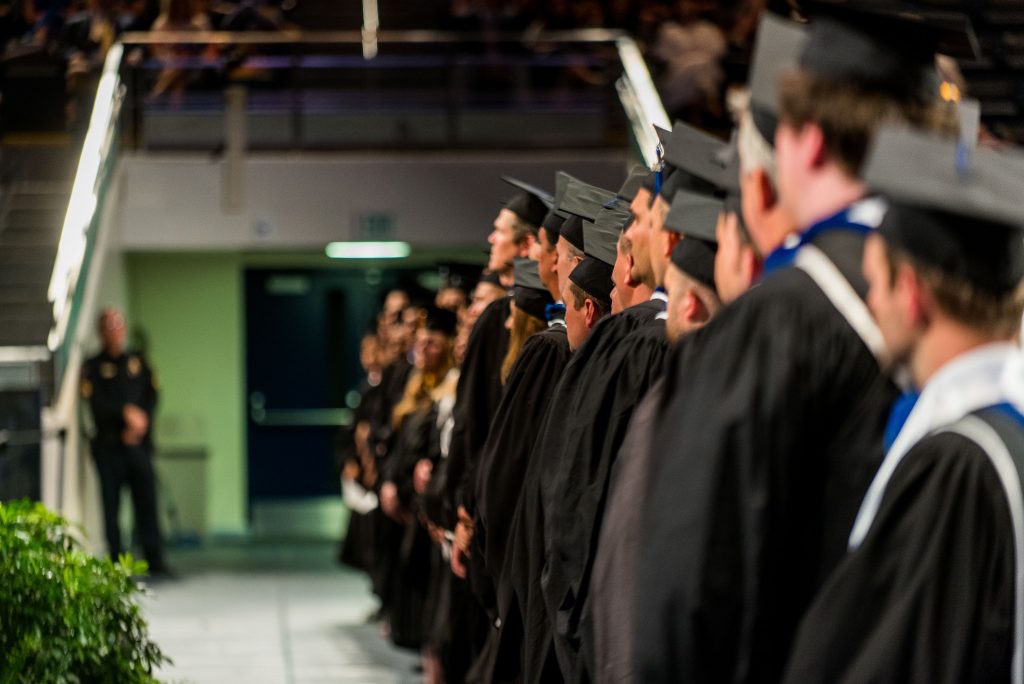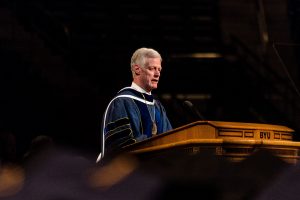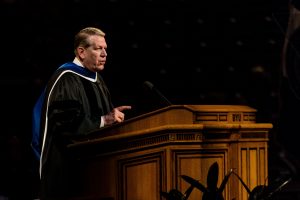
Brigham Young University President Kevin J. Worthen implored graduating students to remember BYU as a ‘nurturing mother’ in his commencement address on Thursday, Aug. 17, 2017, in the BYU Marriott Center.
Worthen spoke of the origins of the Latin phrase ‘alma mater’ and said it could be translated to mean ‘nurturing mother.’
“The idea that universities play a special nurturing role in the development of their students … has taken hold in American society to the extent that the prevailing definition of ‘alma mater’ now is the university or college from which one has graduated,” Worthen said.
He encouraged graduates to look to the family, friends and faculty members who have shaped them as their personal “alma maters.”

“When you hear the term ‘alma mater,’ I urge you to think not of buildings or bricks and mortar, but of people and relationships,” Worthen said. “When you proudly proclaim that BYU is your alma mater, please have in mind all the alma maters who have
contributed to you in so many ways and look for ways to thank them.”
Worthen advised the graduates to take the experiences they had at BYU forward and to nurture others as they live their lives.
Amy Fennegan, the BYU Alumni Association president, encouraged graduates to remember their “BYU story” and to stay connected to the university through the alumni association.
“Our BYU stories have played a major role in shaping us,” Fennegan said. “We all leave this place with memories and experiences that have shaped our future for good and serve as a springboard for the next phase of life. The Alumni Association is really all about this next phase.”
The graduating student speaker for commencement was Michael Morgan, who shared some of his experience at BYU.
“It is a testament that BYU’s education works when a freshman as awkward as I was can enter BYU and emerge ready for the workforce,” Morgan said. “I can honestly say my BYU experience has changed who I am for the better.”
Morgan spoke about identity and said graduates must know who they are, especially when their circumstances and status in life may change.
“There is a fundamental part of our identity that continues no matter what changes we experience in our lives,” Morgan said. “That fundamental piece of our identity is that we are children of a Heavenly Father who loves us.”
The final speaker for the commencement exercises was Elder Donald L. Hallstrom, a member of the Quorum of the Seventy for The Church of Jesus Christ of Latter-day Saints.
Hallstrom commented on the growing diversity of BYU students and noted a key similarity in all of the graduates.
“Yes, there are cultural and socioeconomic differences in the places you come from, and that variety is part of the strength of this university; however, do not forget — in the way that matters most, we are all the same,” Hallstrom said. “We are all children of the same eternal Father. That understanding is what makes BYU truly special as it provides the spiritual foundation that gives the academic efforts perspective and importance.”
After congratulating the graduates, Hallstrom emphasized the importance of the event being called ‘commencement’ and not ‘conclusion.’
“Yes, it may conclude your formal education, at least on this campus, but it is the beginning of a new season of life,” Hallstrom said. “You may find that exciting. You may find it a little overwhelming. But in any case, it is going to happen. You are moving on to new ventures and, hopefully they exemplify progression in your life’s goals.”

Hallstrom shared a story about a performer on ‘The Ed Sullivan Show’ who balanced spinning plates on the tops of poles. He said the performer would continue adding plates on poles until he inevitably reached his limit and plates began crashing on the floor. Hallstrom related this performance to the graduates’ lives and how it is important to know and decide how many “poles” they can manage.
“Seeking balance — giving adequate time and effort to each of those things that really matter— is vital to our success in mortal probation,” Hallstrom said. “There are certain fundamental responsibilities we cannot neglect without serious consequence.”
He said there are four essential ‘poles’ to focus on in life: love for Heavenly Father and Jesus Christ, care for family, service to the Lord and life’s temporal work.
According to Hallstrom, each “pole” needs constant care to fulfill its role in making the graduates whole. He said it is important as followers of Christ to evaluate what is the most important in our lives.
“If we are out of balance, we can change,” Hallstrom said. “We can delay and be compelled by the tragedy of a failing family, or the sorrow of losing our own spirituality, or we can be attentive and continually nudged by the whisperings of the Holy Spirit. Seeking balance among the essential responsibilities of life is preparatory to salvation.”
Hallstrom concluded his remarks by counseling the graduates to keep a continual focus on the important parts of life and to stay clear of confusion from the world.
“My dear young friends, we need you, the Lord needs you, and you are needed forever —faith-filled, converted and covenant-keeping,” Hallstrom said. “Bless you now, bless you in our critical next season of life and bless you forever.”




